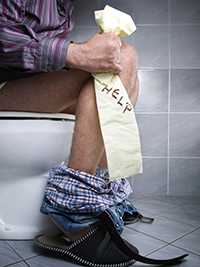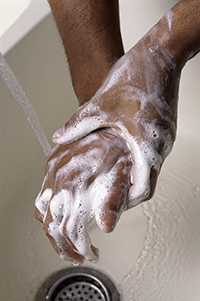Shigella Infections among Gay & Bisexual Men
Print-and-Go Fact Sheet
 Shigella Infections among Gay and Bisexual Men. [PDF - 986 KB]
Shigella Infections among Gay and Bisexual Men. [PDF - 986 KB]
Content contains mature language.
Patient Information
Note: Content below contains mature language.
Gay, bisexual, and other men who have sex with men (MSM)†are at risk for Shigella infections.

What is Shigella?
 Shigellosis is a common diarrheal disease caused by a group of bacteria called Shigella. Symptoms of shigellosis typically start 1–2 days after exposure and include:
Shigellosis is a common diarrheal disease caused by a group of bacteria called Shigella. Symptoms of shigellosis typically start 1–2 days after exposure and include:
- Diarrhea (sometimes bloody)
- Fever
- Abdominal pain
- Tenesmus (a painful sensation of needing to pass stools when bowels are empty)
How is Shigella spread?
 Shigella germs are present in the feces (poop) of people with shigellosis while they have diarrhea and up to a few weeks after the diarrhea has gone away. Shigella is very contagious; exposure to even a tiny amount of fecal matter (poop) with Shigella in it can cause infection. Symptoms usually start 1-2 days after exposure.
Shigella germs are present in the feces (poop) of people with shigellosis while they have diarrhea and up to a few weeks after the diarrhea has gone away. Shigella is very contagious; exposure to even a tiny amount of fecal matter (poop) with Shigella in it can cause infection. Symptoms usually start 1-2 days after exposure.
Transmission of Shigella infection occurs in the following ways:
- Person-to-person contact. Shigella passes from stools or soiled fingers of one person to the mouth of another person, which can happen during sexual activity. Oral-anal sex, or sucking or licking of the anus (anilingus or "rimming"), may be especially risky.
- Eating food contaminated by someone who has shigellosis.
- Swallowing recreational or drinking water that was contaminated by infected fecal matter (poop).
Why should MSM be concerned about Shigella?
- MSM are more likely to acquire shigellosis than the general adult population 1.
- Many shigellosis outbreaks among MSM have been reported in the United States, Australia, Canada, Japan, and Europe since 1999 2-7, 10-12.
- MSM are more likely than others to get infected with Shigella that is resistant to antibiotics commonly used to treat adults who have shigellosis 4-6, 8, 10-12. Therefore, MSM who get shigellosis may need to see their healthcare providers repeatedly before receiving treatments that will work. Additionally, they may require injectable antibiotics rather than antibiotics that can be taken by mouth.
- HIV-infected persons can have more severe and prolonged shigellosis, including having the infection spread into the blood, which can be life-threatening 9.
How will I know if I have a Shigella infection?
See your healthcare provider if you have symptoms of shigellosis. Healthcare providers can test your feces (poop) to determine if you are infected with Shigella. They can order an additional test at the same time to check whether your Shigella strain is resistant to antibiotics.
How can Shigella infections be treated?
Diarrhea caused by Shigella usually goes away without antibiotic treatment in 5 to 7 days. People with mild shigellosis may need only fluids and rest. However, antibiotics are useful for severe cases of shigellosis because they can reduce the duration of symptoms. Tell your healthcare provider if you do not get better within a couple of days after starting antibiotics. He or she can do additional tests to learn whether your strain of Shigella is resistant to the antibiotic you are taking.
I was diagnosed with shigellosis. What can I do to avoid giving it to other people?

- Wash your hands with soap after going to the bathroom.
- Wait to have sex until you no longer have diarrhea (ideally, wait for a few weeks after that because you can have Shigella germs in your stool for weeks after you recover). When you start having sex again, wash your body and hands before and after sex. During oral-anal sex (anilingus or "rimming"), use barriers, such as condoms, natural rubber latex sheets, dental dams, or cut-open non-lubricated condoms between your rectum and your partner’s mouth. Use condoms during anal sex.
- Do not prepare food for others while you are sick. After you get better, wash your hands carefully with soap before preparing food for others.
- For those who work in healthcare, food service, or childcare, follow your local health department’s guidance about exclusion from work while ill and returning to work after you have recovered.
How can I reduce my risk of getting shigellosis?

- Meticulously washing your hands with soap during key times:
- Before eating
- After changing a diaper
- After helping to clean another person who has defecated (pooped)
- Avoid sexual activity with those who have diarrhea or who recently recovered from diarrhea.
- Reduce fecal-oral exposure during sex:
- Wash your genitals, anus, and hands before and after sexual activity.
- Use barriers like condoms or dental dams during oral sex and oral-anal sex and latex gloves during anal fingering or fisting.
- Use condoms during anal and vaginal sex to prevent other sexually transmitted infections.
- Avoid swallowing recreational (for example, lake or river water while swimming) or drinking water that was contaminated by infected fecal matter.
- When traveling internationally, follow food and water precautions and wash hands with soap frequently.
Where can I get more information?
- CDC. Proctitis, Proctocolitis, and Enteritis
- CDC. Travelers’ Health: Safe Food and Water
- CDC. Travelers’ Health: Yellow Book-Shigellosis
- CDC. Travelers’ Health: Disease Related to Travel
- CDC. Healthy Swimming
- Minnesota Dept. of Health. Shigellosis Fact Sheet for MSM. [PDF - 2 pages]
- Public Health England. Good Session? Bad Case of Diarrhoea? Maybe it's Shigella [PDF - 2 pages]
†The term men who have sex with men is used in CDC surveillance systems because it indicates the behaviors that spread Shigella infection, rather than how individuals self-identify in terms of their sexuality.
References
- Aragon TJ, Vugia DJ, Shallow S, Samuel MC, Reingold A, Angulo FJ, Bradford WZ. Case-control study of shigellosis in San Francisco: the role of sexual transmission and HIV infection. Clin Infect Dis. 2007;44(3):327-34.
- Morgan O, Crook P, Cheasty T, Jiggle B, Giraudon I, Hughes H, Jones SM. Shigella sonnei outbreak among homosexual men, London. Emerg Infect Dis. 2006;12(9):1458-60.
- Okame M, Adachi E, Sato H, Shimizu S, Kikuchi T, Miyazaki N, Koga M, Nakamura H, Suzuki M, Oyaizu N, Fujii T, Iwamoto A, Koibuchi T. Shigella sonnei outbreak among men who have sex with men in Tokyo. Jpn J Infect Dis. 2012;65(3):277-8.
- Gaudreau C, Barkati S, Leduc JM, Pilon PA, Favreau J, Bekal S. Shigella spp. with reduced azithromycin susceptibility, Quebec, Canada, 2012-2013. Emerg Infect Dis. 2014;20(5):854-6.
- Gaudreau C, Ratnayake R, Pilon PA, Gagnon S, Roger M, Levesque S. Ciprofloxacin-resistant Shigella sonnei among men who have sex with men, Canada, 2010. Emerg Infect Dis. 2011;17(9):1747-50.
- Heiman KE, Karlsson M, Grass J, Howie B, Kirkcaldy RD, Mahon B, Brooks JT, Bowen A. Notes from the Field: Shigella with decreased susceptibility to azithromycin among men who have sex with men - United States, 2002-2013. MMWR Morb Mortal Wkly Rep. 2014;63(6):132-3.
- Watson, JT, Jones RC, Fernandez J, Cortes C, Gerber SI, Kuo KJ, Price JS, Brooks JT, Jennings D, Fair M, Mintz E, Bowen A. Shigella flexneri serotype 3 infections among men who have sex with men--Chicago, Illinois, 2003-2004. [PDF - 24 pages] MMWR Morb Mortal Wkly Rep. 2005;54(33):820-2.
- Hoffmann C, Sahly H, Jessen A, Ingiliz P, Stellbrink HJ, Neifer S, Schewe K, Dupke S, Baumgarten A, Kuschel A, Krznaric I. High rates of quinolone-resistant strains of Shigella sonnei in HIV-infected MSM. Infection. 2013;41(5):999-1003.
- Panel on Opportunistic Infections in HIV-Infected Adults and Adolescents. Guidelines for the prevention and treatment of opportunistic infections in HIV-infected adults and adolescents: recommendations from the Centers for Disease Control and Prevention, the National Institutes of Health, and the HIV Medicine Association of the Infectious Diseases Society of America. US Department of Health and Human Services; [cited 2015 Mar 27]; Available from: http://aidsinfo.nih.gov/contentfiles/lvguidelines/adult_oi.pdf [PDF - 407 pages] .
- Page last reviewed: March 14, 2016
- Page last updated: March 14, 2016
- Content source:


 ShareCompartir
ShareCompartir